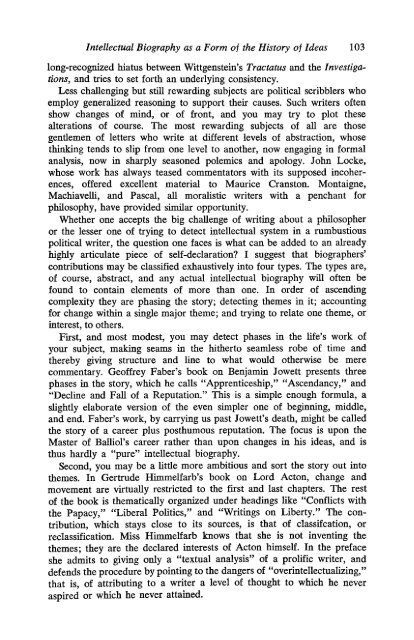philosophy - Interpretation
philosophy - Interpretation
philosophy - Interpretation
Create successful ePaper yourself
Turn your PDF publications into a flip-book with our unique Google optimized e-Paper software.
Intellectual Biography as a Form of the History of Ideas 103<br />
long-recognized hiatus between Wittgenstein's Tractatus and the Investiga<br />
tions, and tries to set forth an underlying consistency.<br />
Less chaUenging but stiU rewarding<br />
subjects are pohtical scribblers who<br />
employ generalized reasoning<br />
to support their causes. Such writers often<br />
show changes of mind, or of front, and you may try<br />
alterations of course. The most rewarding<br />
subjects of aU<br />
to plot these<br />
are those<br />
gentlemen of letters who write at different levels of abstraction, whose<br />
thinking tends to slip from one level to another, now engaging in formal<br />
analysis, now in sharply seasoned polemics and apology. John Locke,<br />
whose work has always teased commentators with its supposed incoher<br />
ences, offered excellent material to Maurice Cranston. Montaigne,<br />
Machiavelli, and Pascal, aU moralistic writers with a penchant for<br />
phUosophy, have provided simUar opportunity.<br />
Whether one accepts the big chaUenge of writing about a philosopher<br />
or the lesser one of trying to detect intellectual system in a rumbustious<br />
pohtical writer, the question one faces is what can be added to an already<br />
highly articulate piece of self-declaration? I suggest that biographers'<br />
contributions may be classified exhaustively into four types. The types are,<br />
of course, abstract, and any actual inteUectual biography<br />
wUl often be<br />
found to contain elements of more than one. In order of ascending<br />
complexity they are phasing the story; detecting themes in it; accounting<br />
for change within a single major theme; and trying to relate one theme, or<br />
interest, to others.<br />
First, and most modest, you<br />
may<br />
your subject, making<br />
thereby giving<br />
commentary. Geoffrey<br />
detect phases in the life's work of<br />
seams in the hitherto seamless robe of time and<br />
structure and line to what would otherwise be mere<br />
Faber's book on Benjamin Jowett presents three<br />
phases in the story, which he calls "Apprenticeship," "Ascendancy," and<br />
"Decline and FaU of a Reputation." This is a simple enough formula, a<br />
slightly elaborate version of the even simpler one of beginning, middle,<br />
and end. Faber's work, by carrying us past Jowett's death, might be called<br />
the story of a career plus posthumous reputation. The focus is upon the<br />
Master of Balhol's career rather than upon changes in his ideas, and is<br />
thus hardly a "pure" inteUectual biography.<br />
Second, you may be a httle more ambitious and sort the story out into<br />
themes. In Gertrude Himmelfarb's book on Lord Acton, change and<br />
movement are virtuaUy restricted to the first and last chapters. The rest<br />
of the book is thematically<br />
organized under headings like "Conflicts with<br />
the Papacy," "Liberal Pohtics," and "Writings on Liberty." The con<br />
tribution, which stays close to its sources, is that of classifcation, or<br />
reclassification. Miss Himmelfarb knows that she is not<br />
inventing the<br />
themes; they<br />
are the declared interests of Acton himself. In the preface<br />
she admits to giving only a "textual<br />
analysis"<br />
of a prolific writer, and<br />
defends the procedure by pointing to the dangers of "overintellectualizing,"<br />
that is, of attributing<br />
aspired or which he never attained.<br />
to a writer a level of thought to which he never
















